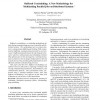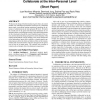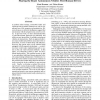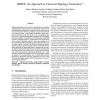327 search results - page 45 / 66 » The Effect of Detail on Ethernet Simulation |
IPPS
2000
IEEE
13 years 11 months ago
2000
IEEE
Buffered coscheduling is a scheduling methodology for time-sharing communicating processes in parallel and distributed systems. The methodology has two primary features: communica...
ATAL
2008
Springer
13 years 9 months ago
2008
Springer
We discuss the design of the Intermediary Agent's brain, the control module of an embodied conversational virtual peer in a simulation game aimed at providing learning experi...
IJCAI
2007
13 years 8 months ago
2007
In modern urban settings, automobile traffic and collisions lead to endless frustration as well as significant loss of life, property, and productivity. Recent advances in arti�...
MASCOTS
2001
13 years 8 months ago
2001
Effective engineering of the Internet is predicated upon a detailed understanding of issues such as the large-scale structure of its underlying physical topology, the manner in wh...
CORR
2008
Springer
13 years 7 months ago
2008
Springer
Jerne's idiotypic-network theory postulates that the immune response involves interantibody stimulation and suppression, as well as matching to antigens. The theory has proved...




